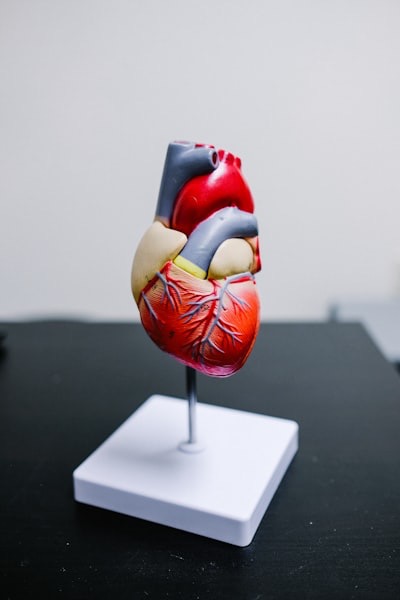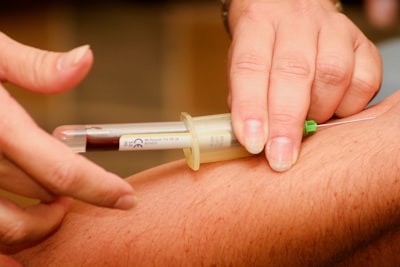Mastering Natural Ways to Lower Cholesterol: Expert Tips
Key Highlights
- Lowering cholesterol is crucial for heart health and can be achieved lifestyle changes.
- Incorporating dietary fiber and unsaturated fats into your diet can help lower cholesterol levels.
- Regular physical activity and maintaining a healthy weight are important for cholesterol.
- Avoiding trans fats and emphasizing plant sterols can also contribute to lower cholesterol.
- Supplements may be beneficial, but it’s important to with a healthcare professional taking them.
Introduction

Ing cholesterol levels is essential for maintaining heart health and reducing the risk cardiovascular diseases. While medication can be prescribed to manage cholesterol, there are natural ways to lower cholesterol levels that can be just as effective. By making simple lifestyle changes and incorporating certain foods into your diet, you can improve your cholesterol numbers and promote a healthier heart without experiencing harmful side effects.
In this blog, we will explore expert strategies for lowering cholesterol naturally. We will discuss the importance of incorporating monounsaturated and polyunsaturated fats into your diet, the benefits of soluble fiber, the role of physical activity and weight management, and the potential benefits of supplements. Additionally, we will address FAQs related to cholesterol-lowering foods and provide tips for achieving and maintaining healthy cholesterol levels.
By following these expert tips, you can take control of your cholesterol levels and improve your overall heart health. Remember, it’s important to consult with a healthcare professional before making any significant changes to your diet or starting a new exercise regimen.
Expert Strategies for Lowering Cholesterol Naturally

Lowering cholesterol naturally involves implementing a range of strategies that can help improve your lipid profile. These strategies include incorporating monounsaturated and polyunsaturated fats into your diet, increasing your intake of soluble fiber, engaging in regular physical activity, and considering the benefits of plant sterols and lipoproteins. By combining these approaches, you can effectively lower your cholesterol levels and reduce your risk of heart disease.
1. Incorporating Monounsaturated Fats into Your Diet

Monounsaturated fats are a type of healthy fat that can help lower cholesterol levels when consumed in moderation. These fats are found in foods such as olive oil, avocados, nuts (such as almonds, cashews, and pecans), and olives. Research has shown that replacing saturated fats with monounsaturated fats can reduce levels of harmful LDL cholesterol and increase levels of beneficial HDL cholesterol. Including these foods in your diet, along with low-fat dairy products, can not only improve your cholesterol numbers but also contribute to overall heart health and reduce the risk of heart disease.
2. Emphasizing Polyunsaturated Fats, Including Omega-3s

Polyunsaturated fats, including omega-3 fatty acids, are another type of healthy fat that can help lower LDL cholesterol levels. Omega-3s are particularly beneficial for heart health and can be found in fatty fish like salmon, tuna, mackerel, and herring. These fatty acids have been shown to reduce LDL cholesterol and decrease the risk of heart disease. Incorporating fatty fish like tuna into your diet, either through fresh or canned options, can provide you with a good source of omega-3s. If you are vegetarian or do not consume fish, you can consider plant-based sources of omega-3s, such as flaxseeds, chia seeds, and walnuts.
3. Reducing Intake of Trans Fats
Trans fats are a type of unhealthy fat that should be avoided or minimized in your diet. These fats are commonly found in processed foods, fried foods, and certain baked goods. Trans fats can raise LDL cholesterol levels and lower HDL cholesterol levels, increasing the risk of heart disease. Food manufacturers are increasingly eliminating trans fats from their products, but it’s important to check food labels to ensure they are trans fat-free. By reducing your intake of trans fats and opting for healthier alternatives, you can improve your cholesterol profile and support heart health.
4. Eating More Soluble Fiber

Incorporating soluble fiber into your diet is an effective way to lower cholesterol levels. Soluble fiber forms a gel-like substance in the digestive tract, which helps remove cholesterol from the body. Here are some sources of soluble fiber that you can include in your diet:
- Whole grains: Opt for whole grain bread, pasta, and cereals instead of refined grains.
- Beans and lentils: These legumes are rich in soluble fiber and can be added to soups, salads, or as a main dish.
- Brussels sprouts: These cruciferous vegetables are not only packed with nutrients but also contain soluble fiber.
- Fruits: Apples, oranges, pears, and berries are all excellent sources of soluble fiber.
- Peas: Add peas to salads, stir-fries, or enjoy them as a side dish.
By incorporating these foods into your diet, you can increase your soluble fiber intake and promote healthy cholesterol levels.
5. Regular Physical Activity

Engaging in regular physical activity is essential for maintaining a healthy heart and managing cholesterol levels. Aerobic exercises, such as brisk walking, jogging, cycling, or swimming, can help raise HDL cholesterol levels and lower LDL cholesterol levels. The American Heart Association recommends at least 150 minutes of moderate-intensity aerobic exercise per week for optimal heart health. Physical activity not only improves cholesterol levels but also helps maintain a healthy weight, reduce blood pressure, and lower the risk of cardiovascular disease. Find activities you enjoy and make them a regular part of your routine to reap the benefits for your heart health.
6. Achieving and Maintaining a Healthy Weight

Maintaining a healthy weight is important for managing cholesterol levels and reducing the risk of heart disease. Excess weight, especially around the waist, can contribute to higher LDL cholesterol levels and lower HDL cholesterol levels. Losing weight, even a modest amount, can significantly improve cholesterol numbers. Aim for a combination of healthy eating and regular physical activity to achieve and maintain a healthy weight. By focusing on weight loss and adopting a healthy lifestyle, you can positively impact your total cholesterol levels and reduce the risk of heart attack.
7. Quitting Smoking for Heart Health

Smoking is not only detrimental to lung health but also has a negative impact on cholesterol levels and heart health. Smoking damages blood vessels, making them more susceptible to the buildup of cholesterol and plaque. It can also lower HDL cholesterol levels, making it more difficult for the body to remove LDL cholesterol from the bloodstream. Quitting smoking is a crucial step in improving cholesterol levels and reducing the risk of heart disease. Speak with your healthcare professional for support and resources to help you quit smoking and improve your heart health.
8. Moderating Alcohol Consumption

Moderate alcohol consumption has been associated with certain health benefits, including increasing good HDL cholesterol levels and reducing the risk of heart disease. However, excessive alcohol consumption can have negative effects on cholesterol levels and overall health. It is important to consume alcohol in moderation and follow the guidelines recommended by health organizations. For men, moderate alcohol consumption is defined as up to two drinks per day, while for women, it is up to one drink per day. It’s important to note that these guidelines may not be suitable for everyone, especially those with certain health conditions or who are taking certain medications. Consult with your healthcare professional to determine the appropriate level of alcohol consumption for you.
9. Including Plant Sterols and Stanols in Your Diet

Plant sterols and stanols are natural compounds found in plants that can help lower cholesterol levels. These compounds have a similar structure to cholesterol and compete with cholesterol for absorption in the digestive system. By consuming foods or supplements fortified with plant sterols or stanols, you can effectively reduce the absorption of dietary cholesterol and lower your total cholesterol levels. Some food sources of plant sterols and stanols include fortified margarine, orange juice, and certain yogurts, making them a great addition to your diet for reducing the amount of cholesterol in your body. Including these foods in your diet can complement other lifestyle changes and contribute to improved cholesterol numbers.
10. Exploring the Benefits of Supplements for Cholesterol Management
Dietary supplements can be an option for managing cholesterol levels, but it’s important to approach them with caution and consult with a healthcare professional before starting any supplement regimen. Here are some supplements that have shown potential benefits in cholesterol management:
- Fish oil: Rich in omega-3 fatty acids, fish oil supplements may help lower triglyceride levels, but their impact on LDL cholesterol is still under debate.
- Psyllium: A type of soluble fiber, psyllium supplements can help lower cholesterol levels.
- Coenzyme Q10: This antioxidant has been studied for its potential cholesterol-lowering effects, but research is ongoing.
It’s important to note that supplements are not a substitute for a healthy diet and lifestyle. They should be used as part of a comprehensive approach to cholesterol management. Always consult with a healthcare professional before starting any supplement regimen to ensure safety and efficacy.
Conclusion
In conclusion, mastering natural ways to lower cholesterol is pivotal for overall heart health and well-being. By incorporating expert strategies like emphasizing healthy fats, increasing fiber intake, staying physically active, and making lifestyle changes, you can effectively manage your cholesterol levels. These natural approaches not only benefit your heart but also promote a healthier lifestyle. Understanding the significance of these strategies and implementing them consistently can lead to improved cholesterol levels and reduced risk of heart-related issues. Prioritizing these natural methods can truly make a positive impact on your health in the long run.
Frequently Asked Questions
What Foods Can Help Reduce Cholesterol Quickly?
Foods that can help reduce cholesterol quickly include oats, almonds, and soy milk. These foods are rich in soluble fiber and other heart-healthy nutrients that can effectively lower LDL cholesterol levels.
Are Eggs Harmful to Cholesterol Levels?
Eggs have long been associated with high cholesterol levels due to their dietary cholesterol content. However, recent research suggests that the cholesterol in eggs does not significantly impact blood cholesterol levels for most people. The American Heart Association recommends consuming eggs in moderation as part of a balanced diet.
How Does Fiber Affect Cholesterol?
Fiber, particularly soluble fiber, plays a crucial role in lowering cholesterol levels. Soluble fiber binds to cholesterol in the digestive system, preventing its absorption into the bloodstream. This process helps lower LDL cholesterol levels and improves digestive health. Incorporating foods like oats, beans, and fruits into your diet can increase your soluble fiber intake.
Can Exercise Alone Lower Cholesterol?
Regular physical activity is an important factor in lowering cholesterol levels. Exercise can increase HDL cholesterol, also known as “good” cholesterol, while decreasing LDL cholesterol, or “bad” cholesterol. Combining aerobic exercises like walking or jogging with strength training can have even greater benefits for cholesterol levels.
What Role Does Weight Play in Cholesterol Levels?
Maintaining a healthy weight is crucial for managing cholesterol levels. Obesity is associated with higher levels of LDL cholesterol and lower levels of HDL cholesterol, increasing the risk of heart disease. Losing weight through a combination of a balanced diet and regular exercise can significantly improve cholesterol levels and overall heart health.
How Effective Are Natural Supplements in Lowering Cholesterol?
Certain natural supplements, such as plant sterols and stanols, have been shown to effectively lower cholesterol levels. These supplements work by blocking the absorption of cholesterol in the digestive system, resulting in reduced LDL cholesterol levels. However, it is important to consult with a healthcare professional before starting any supplement regimen.
Can Quitting Smoking Really Improve Cholesterol Levels?
Quitting smoking can have a significant positive impact on cholesterol levels and cardiovascular health. Smoking increases LDL cholesterol levels while decreasing HDL cholesterol levels, contributing to the development of heart disease. Quitting smoking can help reverse these harmful effects and improve overall cholesterol levels.
Is Alcohol Always Bad for Cholesterol?
Moderate alcohol consumption may have some benefits for heart health, including increasing HDL cholesterol levels. However, excessive alcohol intake can lead to high triglyceride levels and increase the risk of heart disease. It is important to consume alcohol in moderation and consult with a healthcare professional regarding its potential impact on cholesterol levels.
How Do Plant Sterols and Stanols Work to Lower Cholesterol?
Plant sterols and stanols are natural compounds found in plants that have been shown to lower LDL cholesterol levels. These compounds work by blocking the absorption of cholesterol in the digestive system, reducing the amount of LDL cholesterol that enters the bloodstream. Including foods fortified with plant sterols and stanols in your diet can help lower cholesterol levels.
What Are the Immediate Benefits of Lowering Cholesterol?
Lowering cholesterol levels has immediate benefits for cardiovascular health. It can help lower blood pressure, reduce the risk of heart disease, and decrease the likelihood of experiencing a heart attack. Managing cholesterol through lifestyle changes can have a positive impact on overall heart health.
Can Lifestyle Changes Replace Medication for Cholesterol Management?
In many cases, implementing lifestyle changes can effectively manage cholesterol levels without the need for medication. Lifestyle modifications such as adopting a healthy diet, engaging in regular exercise, and quitting smoking can have a significant impact on cholesterol levels. However, in some cases, medication, such as statins, may be necessary to achieve target cholesterol levels.
https://www.ncbi.nlm.nih.gov/pmc/articles/PMC6566984
https://www.heart.org/en/healthy-living/healthy-eating/eat-smart/fats/saturated-fats
https://www.cdc.gov/pcd/issues/2019/19_0121.htm
https://order.store.mayoclinic.com/books/GNWEB43
